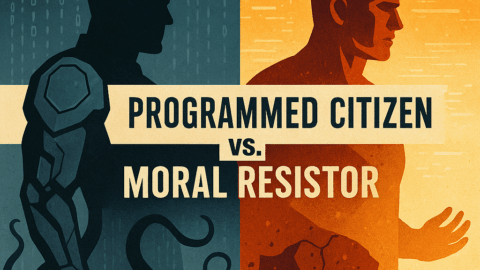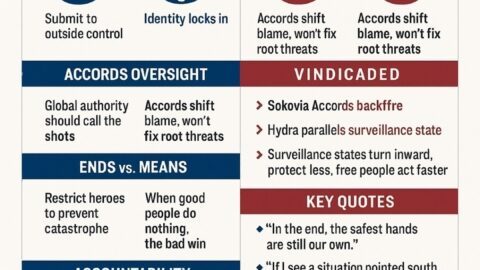Arthur’s note: In order to understand the Hedonic Treadmill, it is recommended to read the prior two articles to get a background on this psychological concept.
- Neuroscience Behind the Hedonic Treadmill
- Hedonic Treadmill & Humanity on the Hampsters Wheel
- Patterns of Dominance Over Nations Through Financial Manipulation, Corruption, and the Exploitation of Local Elites
The hedonic treadmill (or hedonic adaptation) offers an insightful lens to examine how the back-and-forth power struggles between Democrats and Republicans can contribute to the gradual erosion of constitutional principles in the United States. By applying this concept to politics, it becomes clear that the repetitive cycle of shifting priorities, policies, and partisanship leads to a normalization of dysfunction, undermining the foundational values enshrined in the U.S. and state constitutions.
The Hedonic Treadmill in Politics
The Cycle of Political Shifts:
- As Democrats and Republicans alternate control of government institutions, there is often a pendulum swing in policy priorities.
- Each party attempts to undo or counteract the actions of the other, focusing on short-term victories instead of long-term, bipartisan solutions.
- Over time, the public adapts to this cycle, viewing it as “normal,” even when it results in gridlock, instability, or erosion of constitutional rights.
Normalization of Extremes:
- Political extremes become more pronounced as parties cater to their bases to secure votes.
- What once seemed radical becomes normalized over time, pushing both sides further from the constitutional ideals of balance, compromise, and mutual respect.
- This polarization distracts from the overarching principles of governance and the rule of law.
Erosion of Accountability:
- The public’s focus often shifts to the immediate “win” of their preferred party, neglecting the broader implications for constitutional principles.
- Politicians exploit this by prioritizing partisan agendas over their constitutional duty to protect freedoms, uphold justice, and serve the common good.
Constitutional Erosion Through Political “Ping-Pong”
The back-and-forth struggles between Democrats and Republicans have tangible consequences for constitutional integrity:
Erosion of Checks and Balances:
- Each party, when in power, seeks to consolidate influence over the legislative, executive, and judicial branches.
- Overreach by either side can weaken checks and balances, leading to a concentration of power that undermines constitutional protections.
- Example: Executive orders and judicial appointments have increasingly been used as tools to bypass legislative processes, diminishing the role of Congress.
Undermining Federalism:
- The U.S. Constitution outlines a balance between federal and state powers, but partisan politics often disrupt this equilibrium.
- States aligned with the opposition party may resist federal policies, leading to inconsistent enforcement of laws and fragmentation.
- Example: Conflicts over immigration, healthcare, and voting rights demonstrate how partisanship can overshadow constitutional federalism.
Erosion of Civil Liberties:
- Partisan agendas sometimes prioritize party goals over constitutional rights, leading to restrictions on freedoms like speech, assembly, or due process.
- Over time, the public adapts to these erosions, becoming desensitized to the loss of liberties.
- Example: Surveillance programs, voter ID laws, and restrictions on protests are often justified by one party and opposed by the other, creating a cyclical pattern of constitutional overreach.
Judicial Politicization:
- The judiciary, intended to be impartial and independent, has become increasingly politicized.
- Judicial appointments are now viewed through a partisan lens, with the goal of advancing ideological agendas rather than upholding constitutional principles.
- Example: Controversies surrounding Supreme Court nominations highlight the prioritization of political loyalty over legal expertise.
The Role of Hedonic Adaptation
Public Desensitization:
- Just as individuals adapt to material gains or losses, the public adjusts to political dysfunction and constitutional erosion.
- Over time, behaviors and policies that once seemed unacceptable or unconstitutional become normalized, reducing public outrage or resistance.
Short-Term Gratification:
- Voters often prioritize immediate political victories or benefits, such as tax cuts, social programs, or cultural policies, over long-term constitutional stability.
- This focus on short-term gains mirrors the hedonic treadmill, where satisfaction is fleeting and deeper issues remain unaddressed.
Loss of Perspective:
- Constant exposure to partisan conflict and sensationalized media coverage shifts public attention away from constitutional principles to divisive issues.
- The foundational ideals of the U.S. and state constitutions, such as individual rights, separation of powers, and the rule of law, are overshadowed by party loyalty.
How We Are Losing the Constitution
Partisan Legislation:
- Laws passed along party lines often prioritize political agendas over constitutional values, creating legal precedents that erode rights.
- Example: Laws restricting voting access or expanding surveillance powers may serve immediate partisan goals but undermine democratic principles.
Political Apathy and Polarization:
- The public’s adaptation to political dysfunction leads to apathy or resignation, reducing civic engagement and voter turnout.
- Polarization further divides the nation, making it harder to find common ground or uphold shared constitutional principles.
Disregard for Founding Principles:
- Politicians increasingly frame the Constitution as a tool to support partisan goals rather than as a unifying framework for governance.
- This selective interpretation of constitutional principles undermines their universality and weakens their legitimacy.
Solutions to Counter the Cycle
Civic Education:
- Educate citizens about the principles and values of the U.S. Constitution to foster a deeper understanding of its importance.
- Encourage critical thinking to counteract the normalization of dysfunction.
Focus on Bipartisanship:
- Demand collaboration between parties to address systemic issues rather than perpetuating the cycle of partisan conflict.
- Support leaders and policies that prioritize constitutional integrity over political gain.
Engage in Accountability:
- Hold politicians accountable for actions that undermine constitutional principles, regardless of party affiliation.
- Advocate for transparency and reforms that strengthen checks and balances.
Break the Hedonic Treadmill:
- Shift focus from short-term victories to long-term solutions that uphold the Constitution and protect fundamental rights.
- Cultivate gratitude and awareness for the freedoms and structures provided by the Constitution to avoid taking them for granted.
Conclusion
The back-and-forth struggle between Democrats and Republicans, viewed through the lens of the hedonic treadmill, reveals how short-term partisan goals and public desensitization contribute to the gradual erosion of constitutional principles. By recognizing this cycle and taking steps to prioritize long-term stability and shared values, citizens and leaders alike can work to protect and preserve the U.S. and state constitutions for future generations.







